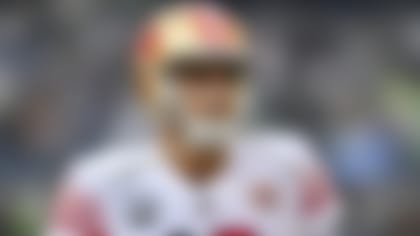Johnny Manziel's career is not over.
It might seem silly to say that, but the vultures have been picking him apart over the past few days.
Here's the truth: As terrible as his first ever NFL start was on Sunday, we should not rush to judge the Cleveland Browns rookie. Adjusting to life as a pro can be a difficult, lengthy process, and it would be incredibly foolish to render a verdict on a player's future based on one awful afternoon.
Billick: Can Johnny be good?

In the wake of Manziel's rough debut, I thought I'd look back at some of the high-level quarterbacks over the years who were especially putrid in their first career starts. One thing to remember: Few of these quarterbacks -- even those who were drafted first overall -- entered the league with the kind of hype that Manziel did. Also, almost every one of these players was tutored at one point or another by an influential and helpful coach. So while we're most definitely NOT saying Manziel is a lock to be as good as any of these quarterbacks, it is worth pointing out that Manziel would do well to listen to and learn from the coaches in Cleveland, particularly offensive coordinator Kyle Shanahan and quarterbacks coach Dowell Loggains. It will be interesting to see if the staff can help Manziel improve his mechanics -- especially his footwork and release -- so that he's better equipped to handle the speed of the pro game.
Below -- presented in alphabetical order -- is a list of seven top-tier quarterbacks who endured ignominious beginnings to their respective NFL careers:
Troy Aikman
Drafted: No. 1 overall by the Dallas Cowboys in 1989.
First start: Loss (28-0) to the Saints in Week 1 of 1989; 17 of 35 (48.6 percent) for 180 yards, zero touchdowns, two interceptions, two sacks and a passer rating of 40.2.
Aikman -- whom I helped scout and draft -- was thrown right into the mix as a rookie. While he didn't seem lost or overwhelmed at all in that first game, he finished his first season -- which was interrupted by a broken finger that cost him five games -- with nine touchdowns against 18 interceptions while averaging just 5.9 yards per pass. Those are not very good numbers. In fact, it wasn't until his third year in the NFL that he managed to throw more touchdowns (11) than picks (10).
So what -- aside from playing for a team that finished 1-15 a year after going 3-13 -- held Aikman back in that first start and the rest of Year 1? I think, in general, a lot of rookie quarterbacks are surprised by the complexity of the game at the pro level and the sophistication of their opponents -- how well people disguise coverages and how effectively they exploit weaknesses. Even while he struggled, though, Aikman still threw a big ball and showed excellent accuracy. Norv Turner -- Aikman's offensive coordinator from 1991 to 1993 -- will tell you he's never seen a quarterback as accurate as this guy.
John Elway
Drafted: No. 1 overall by the Baltimore Colts in 1983 (traded to Denver Broncos).
First start: Win (14-10) over the Steelers in Week 1 of 1983; 1 of 8 (12.5 percent) for 14 yards, zero touchdowns, one interception, four sacks and a passer rating of 0.
Elway's debut was marred by an elbow injury that forced him out of the game, but his second start (9 of 21 for 106 yards, zero touchdowns and three sacks) wasn't much better. He went on to have a relatively rough rookie season -- 7:14 TD-to-INT ratio and 28 sacks in 11 games -- in which he was benched after three consecutive losses. But he also was part of a team that made the playoffs that year, and he ended up leading the Broncos to three Super Bowl appearances, five playoff berths and six winning seasons over the next nine years. Still, in many ways, the jury was still out on the quarterback, who threw just one more touchdown pass (158) than he did picks (157) from 1983 to 1992. He was kind of like a wild colt, so to speak, in that he would run around and scramble somewhat recklessly and make risky throws across his body.
In 1993, he seemed to turn a corner, and he really took off in 1995, when Mike Shanahan -- who spent two previous stints on Denver's staff during Elway's career -- became the Broncos' head coach. In the final four years of his career, Elway posted a record of 43-16, threw 101 touchdown passes against 49 picks and, of course, won two Super Bowls.
Andrew Luck
Drafted: No. 1 overall by the Indianapolis Colts in 2012.
First start: Loss (41-21) to the Bears in Week 1 of 2012; 23 of 45 (51.1 percent) for 309 yards, one touchdown, three interceptions, three sacks and a passer rating of 52.9.
Luck struggled some initially with the speed of the game and maybe tried to force the ball more than he should have. But he seemed to compress the normal timeframe of development for a rookie quarterback, bouncing back from a 1-2 start to lift Indy to an 11-5 record and a playoff berth. The Colts' relatively easy schedule and roster -- which, though it lacked some pieces, was better than what most No. 1 picks have to work with in Year 1 -- helped. But Luck also showed a knack for winning games, compiling seven game-winning drives as a rookie. It couldn't have hurt that his father, Oliver Luck, and his college coach, Jim Harbaugh, were both former NFL quarterbacks.
Peyton Manning
Drafted: No. 1 overall by the Indianapolis Colts in 1998.
First start: Loss (24-15) to the Dolphins in Week 1 of 1998; 21 of 37 (56.8 percent) for 302 yards, one touchdown, three interceptions, four sacks and a passer rating of 58.6.
Manning has, of course, become one of the premier quarterbacks in the game, earning 13 Pro Bowl nods and five MVP awards in 14 years with the Colts and two-plus years with the Denver Broncos. And though he set what was then a rookie record with 3,739 yards, he also went 3-13 in his first year with Indy -- and believe me when I tell you that a lot of people were asking whether he was good enough to hack it. In fact, after a less-than-stellar performance in a Week 5 victory over Ryan Leaf's Chargers that season, there were even some folks hollering that Indy should've taken Leaf instead of Manning with the first overall pick in the 1998 NFL Draft.
That Manning -- who was very well coached at Tennessee and has such a great understanding of the game -- stumbled out of the gate like that just illustrates how hard it is to start right away as a rookie, especially with the competitive balance being so great in the NFL. Of course, Manning was a tireless worker even then, and, with the help of assistant Tom Moore, grew into the all-time talent we know today.
Alex Smith
Drafted: No. 1 overall by the San Francisco 49ers in 2005.
First start: Loss (28-3) to the Colts in Week 5 of 2005; 9 of 23 (39.1 percent) for 74 yards, zero touchdowns, four interceptions, five sacks and a passer rating of 8.5.
Smith is very smart, but it took time for that to translate to the NFL gridiron. He had a horrifically bad rookie year, taking 29 sacks and throwing 11 picks in just nine games (seven starts) while posting a sub-40 passer rating four times. Smith didn't find the end zone until the final game of the season, a 20-17 win over Houston. He seemed reluctant to throw downfield and didn't break out of checkdown mode for years.
It wasn't that Smith, who was neck and neck with Aaron Rodgers in my pre-draft scouting as a prospect, lacked talent. I think a key factor was that he just didn't get as lucky as other guys did in terms of the kind of coaching he received as a rookie. When Jim Harbaugh arrived in 2011, he turned Smith into a good quarterback, and the signal-caller has continued to thrive with the Chiefs under Andy Reid. Just look at his numbers since '11: 38-15-1 record with a TD-to-INT ratio of 71:23.
Fran Tarkenton
Drafted: No. 29 overall (third round) by the Minnesota Vikings in 1961.
First start: Loss (21-7) to the Cowboys in Week 2 of 1961; 8 of 24 (33.3 percent) for 117 yards, zero touchdowns, two interceptions, three sacks and a passer rating of 15.5.
Tarkenton's first official start paled in comparison to what he accomplished in his true debut the week before, when he came off the bench to complete 74 percent of his passes for 250 yards and contribute five touchdowns (four in the air and one on the ground) to a 37-13 win over the Bears -- the first ever victory for the Vikings franchise. The rest of his season was a bit rockier, as he went 2-8 in 10 starts while posting a TD-to-INT ratio of 18:17 over 14 games. He had mixed results over the next few years before being traded to the Giants in 1967. This, he recently told me in a conversation on the phone, is when he turned his career around, installing the offense himself and calling the plays in New York as a 27-year-old quarterback; he credits himself as being the person most responsible for his ascension.
After a successful stint in New York, Tarkenton was traded back to the Vikings in 1972 -- and proceeded to make the playoffs from 1973 to 1978, going on a run that included three Super Bowl appearances and saw him win the MVP award in 1975. He was a scrambler who overcame a lack of height -- he was 6 feet if you stretched him out -- and learned how to complement his scrambling ability with his arm.
Steve Young
Drafted: No. 1 by the Tampa Bay Buccaneers in the 1984 supplemental draft.
First start: Win (19-16, OT) over the Lions in Week 12 of 1985; 16 of 27 (59.3 percent) for 167 yards, zero touchdowns, zero interceptions, six sacks and a passer rating of 77.2; 10 carries for 60 yards.
Young wasn't exactly a rookie when he entered the NFL, having spent two years with the Los Angeles Express of the USFL before going to Tampa Bay. Perhaps Young became used to the lesser competition he saw in his first pro league, because he struggled with the Bucs, compiling a record of 3-16 as a starter while throwing nearly twice as many interceptions (21) as he did touchdown passes (11). Tampa Bay shipped him to San Francisco for a second- and a fourth-round pick in 1987 -- laying the groundwork for his career to take off into the stratosphere.
Even that took time, of course, as Joe Montana was entrenched at quarterback when Young joined the Niners. But ultimately, coach Bill Walsh and his West Coast system shaped Young into the man who won two MVP awards and helped San Francisco score the third-most points in Super Bowl history in a 49-26 win over San Diego.
Follow Gil Brandt on Twitter _@GilBrandt_.












